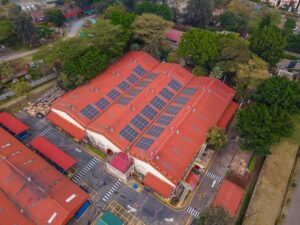Henkel AG (Düsseldorf, Germany) has achieved a groundbreaking sustainability milestone, with its Nairobi, Kenya manufacturing site now fully powered by 100% renewable electricity. This accomplishment marks a significant step forward for Henkel’s sustainability efforts in the region, highlighting Kenya’s leadership in the transition to clean energy.
Henkel Kenya is among eight manufacturing sites of the Adhesive Technologies business unit in the Middle East and Africa, that have successfully transitioned to renewable electricity sources, eliminating carbon dioxide (CO2) emissions from their electricity usage, also known as Scope 2 emissions. This shift includes on-site solar installations and external renewable sources such as hydroelectric and wind energy.

Henkel has reached a 100% renewable electricity milestone at Nairobi site in Kenya (Source: Henkel)
Speaking on this landmark achievement, Nancy Mwathi, Plant Manager for Henkel’s Nairobi Adhesives Factory, shared her excitement: “This is a tremendous milestone for our team and a key part of Henkel’s broader vision. Seeing this project, which began in 2021, come to fruition in 2024 has been both exciting and transformative. By aligning our goals with Henkel’s 2030+ Sustainability Ambition Framework, we are not only contributing to global ambitions but also making a tangible impact on the ground here in Kenya.”
Henkel’s Nairobi factory has transitioned to renewable electricity sources, including on-site solar installations, helping eliminate Scope 2 emissions and significantly reducing its carbon footprint. This shift to renewable energy is expected to avoid around 3.5 tons of CO2 emissions annually, setting a new benchmark for sustainability in the country.
Currently, the solar installation at Henkel’s Nairobi site provides about 95% of daily electricity needs on optimal days, while the remaining 5% runs on external renewable sources. The plant is exploring ways to further expand this capacity, reinforcing Henkel’s environmental responsibility.
Through its initiatives, Henkel has eliminated approximately 10,471 tons of CO2 emissions per year from its Scope 2 activities, equivalent to removing the carbon footprint of around 2,500 gasoline-powered cars driven for one year or ca. 2,700 flights from New York to Singapore. By drastically reducing its reliance on fossil fuels, Henkel is making a substantial environmental impact and setting a benchmark for the industry.
Mwathi further emphasized the long-term vision for the plant: “The journey towards setting a net-zero pathway is well underway. We are looking into increasing our solar capacity and integrating more renewable electricity sources at all our sites worldwide. Our focus now is on achieving greater sustainability through initiatives like water and waste circularity, which will play a crucial role in our future plans.”
Aligned with Henkel’s 2030+ Sustainability Ambition Framework, this achievement is part of Henkel’s broader goal to create value through purposeful growth and responsible business development. “Our transition to renewable energy is about much more than just reducing emissions. It’s about setting a standard in Kenya and across the region. We are committed to fostering a future where sustainability and business success go hand in hand,” concluded Mwathi.
With this milestone, Henkel continues to lead by example, showcasing that sustainable practices can drive positive environmental impact while achieving operational excellence.